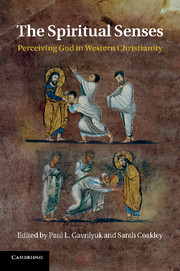Book contents
- Frontmatter
- Contents
- Contributors
- Foreword
- Abbreviations
- Introduction
- Chapter 1 Origen of Alexandria
- Chapter 2 Gregory of Nyssa
- Chapter 3 Augustine
- Chapter 4 Gregory the Great
- Chapter 5 Pseudo-Dionysius the Areopagite
- Chapter 6 Maximus the Confessor
- Chapter 7 Alexander of Hales
- Chapter 8 Thomas Gallus
- Chapter 9 Bonaventure
- Chapter 10 Thomas Aquinas
- Chapter 11 Late medieval mystics
- Chapter 12 Nicholas of Cusa
- Chapter 13 Jonathan Edwards and his Puritan predecessors
- Chapter 14 John Wesley
- Chapter 15 Karl Rahner and Hans Urs von Balthasar
- Chapter 16 Analytic philosophers of religion
- Select bibliography
- General index
- Index of select biblical references
- References
Chapter 6 - Maximus the Confessor
Published online by Cambridge University Press: 05 December 2011
- Frontmatter
- Contents
- Contributors
- Foreword
- Abbreviations
- Introduction
- Chapter 1 Origen of Alexandria
- Chapter 2 Gregory of Nyssa
- Chapter 3 Augustine
- Chapter 4 Gregory the Great
- Chapter 5 Pseudo-Dionysius the Areopagite
- Chapter 6 Maximus the Confessor
- Chapter 7 Alexander of Hales
- Chapter 8 Thomas Gallus
- Chapter 9 Bonaventure
- Chapter 10 Thomas Aquinas
- Chapter 11 Late medieval mystics
- Chapter 12 Nicholas of Cusa
- Chapter 13 Jonathan Edwards and his Puritan predecessors
- Chapter 14 John Wesley
- Chapter 15 Karl Rahner and Hans Urs von Balthasar
- Chapter 16 Analytic philosophers of religion
- Select bibliography
- General index
- Index of select biblical references
- References
Summary
Maximus’s religious epistemology of perception, and more specifically his account of the spiritual senses, is grounded in the larger projects of ascetic theology and deification. These theological endeavours, as I hope to show, provide the backdrop for understanding why and how he links spiritual perception with the integration of the self. As Polycarp Sherwood rightly points out, deification for Maximus is all about gnomic reform, that is, whether humans will deliberate and move in the direction of realizing fully the capacities of their nature. Accordingly, Maximus’s religious epistemology of perception focuses on the interplay of the rational, the volitional and the sensate, fleshing out how the process of deification redirects the self and reaffirms its true nature, dignity and nobility. This involves cultivating a properly disposed mind that moves perceptual and intellectual capacities to ‘the place of divine wisdom’.
Redirecting the self to its proper end, however, does not suggest the annulment of the natural faculties; rather the aim is to purge the self of its divisive and destructive tendencies and move towards a more holistic way of existence. According to Maximus, receiving ‘the mind of Christ comes along not by any loss of our mental power, nor as a supplementary mind to ours, nor as essentially and personally passing over into our mind, but rather as illuminating the power of our mind with its own quality and bringing the same energy to it’. As a result, Maximus’s account of spiritual perception neither pits the intellectual, volitional and the sensate against one another, nor does it demand a radical shutting-down of the natural faculties. Conversely, the goal is to bring together these different facets of human selfhood, and to reflect the unity of all things recapitulated in the incarnation.
- Type
- Chapter
- Information
- The Spiritual SensesPerceiving God in Western Christianity, pp. 104 - 120Publisher: Cambridge University PressPrint publication year: 2011
References
- 2
- Cited by



